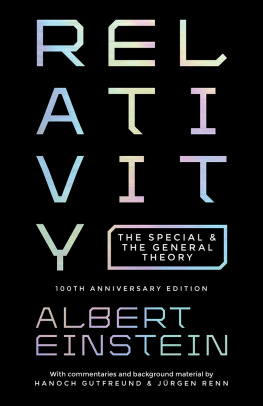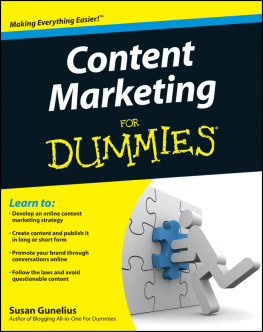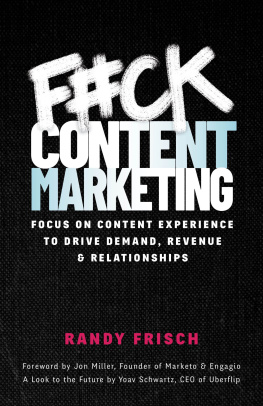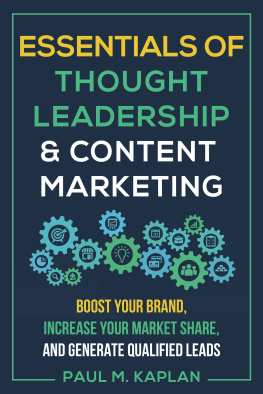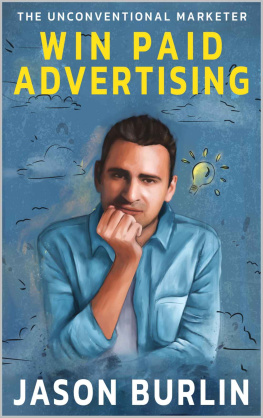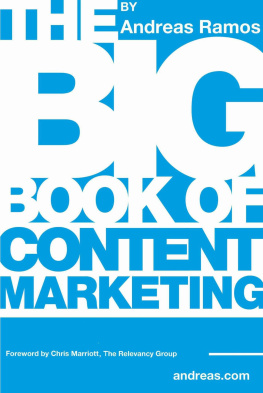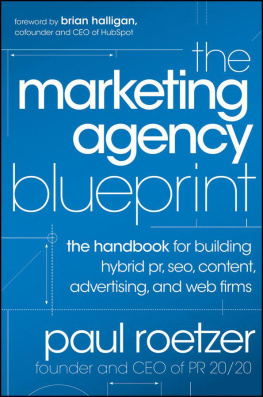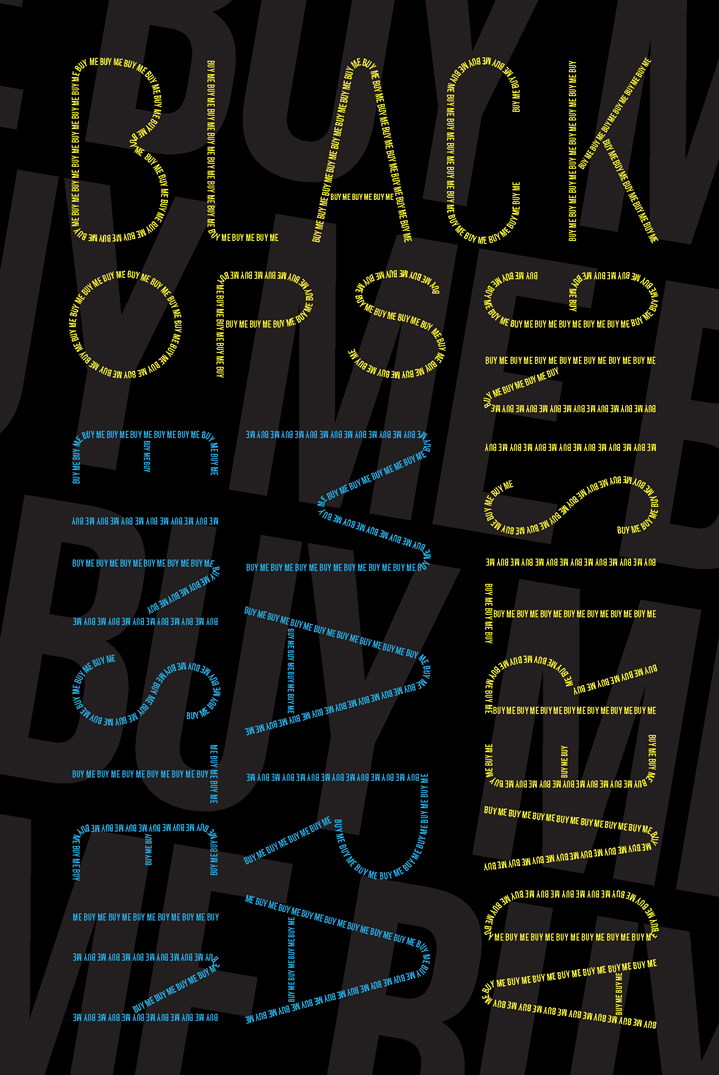

2016 Mara Einstein
Published for the book trade by OR Books in partnership with Counterpoint Press. Distributed to the trade by Publishers Group West
All rights information:
All rights reserved. No part of this book may be reproduced or transmitted in any form or by any means, electronic or mechanical, including photocopy, recording, or any information storage retrieval system, without permission in writing from the publisher, except brief passages for review purposes.
First printing 2016
Cataloging-in-Publication data is available from the Library of Congress.
A catalog record for this book is available from the British Library.
Text design by Under|Over. Typeset by AarkMany Media, Chennai, India.
10 9 8 7 8 5 4 3 2 1
ebook ISBN 9781944869168
There is no need for advertisements to look like advertisements. If you make them look like editorial pages, you will attract about 50 percent more readers. You might think that the public would resent this trick, but there is no evidence to suggest that they do.
David Ogilvy, founder, Ogilvy & Mather
Nobody comes to Buzzfeed to look at the ads, but theyll come for the content. When the advertising is contentgood content theyre willing to click on and engage with, and share if its goodthats the future for publishers.
Jonah Peretti, founder, BuzzFeed
To David, for listening to me,
for believing in me, for loving me
Table of Contents
Guide
TABLE OF CONTENTS
Ads are baked into content like chocolate chips into a cookie. Except its more like raisins into a cookie, because no one fucking wants them there.
John Oliver
On October 14, 2012, Felix Baumgartner attempted the impossibleto dive from outer space going faster than the speed of sound. Wearing what looked like a battery pack out of a 1950s sci-fi movie, millions of people watched as this Austrian jumped from a space pod surrounded by darkness to land safely in a sunlit field 128,000 feet below. Successfully traveling at 844 miles per hour, this leap was a triumph of technology and one mans fearlessness that became the talk of the world, a twenty-first-century version of Neil Armstrongs walk on the moon.
Years of planning had gone into this. Technologies were developed, test jumps executed, and millions of dollars spent. Numerous television networks were asked to be part of the project, and many turned it down. You cant really blame them. This project was dangerous. Weather conditions had to be perfect. The network and production crew had to be ready at a moments notice. And there was the real possibility that the network would show, live, a man jumping to his death. Discovery Channel took on the challenge and aired this daredevils plunge, creating one of the highest-rated programs in the networks history.
But this exceedingly risky endeavor wasnt a NASA mission or a physics experiment out of Carnegie Mellon. It was an extreme event called Stratos that had been developed and paid for by Red Bull, a producer of energy drinks popular with teens, young adults, and college students cramming for finals. Marketed with the tagline Red Bull gives you wings, the product is all about communicating that the company is on the cutting edge of pop culture. So cutting edge that the only clues to commercialization in the video are subtle displays of the Red Bull logo that fit seamlessly into the contenton the space pod, on Baumgartners space suit, on t-shirts of people watching in the crowd below, and so on. The camera never lingers on these symbols and the viewers attention is on the fantastic achievement about to occur, so unless you know to look for them they are easy to miss.
Incredibly, then, all this work, money, and even risk to a persons life were nothing more than an elaborate, exceptionally well-executed piece of advertising.

Stunning events with arresting visuals like Stratos are part of a growing advertising phenomenon known as content marketing, a straightforward-sounding yet ultimately vague way to describe the means through which advertisers get people to spend time watching or reading content that the advertiser has paid for. The content masquerades as news (or entertainment) and, when executed to perfection, results in successful stunts like the Red Bull leap from space. This trend has become so pervasive that marketers are starting to proclaim that content marketing might soon become the only type of marketing left. Chances are, though, that youve never heard of content marketing, and thats exactly the point.
A key aspect of this marketing tool is to engage consumers without their realizing theyve taken part in a promotional initiative. Red Bull did this brilliantly. In praising the Stratos jump as one of the best advertising campaigns of the twenty-first century, a senior executive noted in industry magazine Advertising Age: The beauty of it was that it didnt feel like you were being sold something.
Red Bulland now almost every consumer marketer on the planet (close to 90 percent)uses content marketing. They use it because it works. In this case, 37 million people watched a short YouTube video, while others viewed longer more detailed versions, or edits in different languages, or a documentary on Discovery, or as the lede news story in print or on televisionfree media for the brand that totaled in the tens of millions of dollars in the U.S. and conservative estimates suggest that this totaled more than six billion Euros worldwide in the first three days alone.
One small step for man... one giant leap for Red Bull.
CONTENT CONFUSION
Even with twenty-plus years of marketing experience, I didnt initially realize that this was an advertising ploy. I watched the jump as others had, and I never once thought that I was being sold an extreme energy drink. I thought I was watching news.
That Red Bull doesnt opt to use traditional advertising is their prerogative. But if the content is worthy of our attention, why doesnt the company attach its name to it? The answer is easy: Red Bull is well aware that if we knew an advertiser was involved, most of us would not watch it. Years of remote controls, DVRs, and now banner blindness and ad blockers have taught advertisers that consumers are utterly adept at circumventing advertising. In response, they have turned to new and improved forms of clandestine marketing.
Obscured persuasion, broadly known as stealth marketing, is defined as the use of surreptitious marketing practices that fail to disclose or reveal the true relationship with the company that produces or sponsors the marketing message. While not new, these hidden marketing practices have reached new heights and more devious methods in the age of social media. And with those methods have come a multitude of namescovert marketing, undercover marketing, embedded marketing, and more recently, content marketing, native advertising, buzz marketing, and brand journalism, among many, many others. There are few straightforward definitions for these strategies, but the goal is clear: find ways to get products in front of people subtly, so they dont realize they are being persuaded to purchase those products, as well asthe pice de rsistanceto push those products to their friends, creating a world where we are in a constant state of buying or selling.


